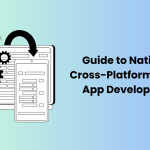Can you imagine a day without your smartphone? Is it comprehendible that you do not use apps on your phone for one whole day? No, not possible! Mobile apps are imperative for us as they make our lives easier, convenient and productive. We cannot think of our life without hanging around various apps all day. Mobile apps are gaining huge popularity due to the fact that smartphone users are exponentially growing, and businesses are also transitioning from traditional to modern approaches. Therefore, mobile apps are inevitable.
The mobile app development landscape has evolved significantly over the years. With the proliferation of latest technologies and frameworks, we are constantly moving towards an era of bigger and better apps. App development frameworks essentially empower developers in developing efficient and engaging apps.

In this article, we have tried to cover every minor detail related to mobile app development frameworks.
Before digging deep into the topic, let’s first take a comprehensive view of what is a mobile app framework.
What is a Mobile App Framework?
App development frameworks are tools and platforms that enable developers to build mobile apps in a structured environment. The structured approach comes in the form of a pre-built set of components, tools, and libraries that sky-rocket app development processes, enhance code reusability and optimize app performance. Developers can efficiently create mobile apps using built-in tools and save time and other resources.
Having successful mobile apps for your businesses sounds fancy, but the planning, development and execution are not simple. It requires in-depth research, planning and solid strategy to get started and get going.
These frameworks provide a solid base to the coders, designers and developers to build competitive apps and act as catalysts during the app development process. Using frameworks for the development of apps reduces chances of errors, improves efficiency and maintains consistency across various platforms. It not only simplifies the process, but also makes the development a hassle-free process.
There are mainly two types of mobile app frameworks
- Native Frameworks
- Cross Platform Frameworks
Native frameworks (as the name implies) are special types of frameworks that enable developers to create apps for a particular platform (Android or iOS) using platform’s native tools and programming language. Native frameworks make the most out of the device’s hardware and capabilities.
On the flip side, cross platform mobile app development frameworks offer various tools to developers so that they can develop cross-platform apps to be run on multiple platforms. These frameworks use web technologies such as CSS, HTML and JavaScript.
Until now, you must be convinced of the importance of app development frameworks. Now let’s read some of the best frameworks to choose for in 2024.
Top Mobile App Development Frameworks to Look for in 2024
1: Flutter
Google’s open-source Flutter framework enables the creation of native Android and iOS apps from a single codebase. It is a ground-breaking SDK for Cross-Platform App Development that stands out for using an original strategy to offer apps with a native-like appearance and feel. It is an unrivalled and incredibly dependable mobile UI framework that accelerates the development process while enabling the creation of visually attractive apps. Flutter is a full framework that enables developers to create and distribute visually appealing mobile apps by providing widgets, a rendering engine, tools for testing and connecting APIs, and more.
2: React Native
One of the most popular mobile app development frameworks, React Native enables developers to create top-notch apps for both the iOS and Android platforms. Based on the React JavaScript framework, it makes it simple for developers to construct intricate UI designs. Given that React Native is an open-source framework and has a sizable developer community, there are tons of resources and support services available. Additionally, it supports hot-reloading, which enables programmers to observe changes as they happen.
3: Ionic
Ionic is an open-source cross platform mobile app development framework that was created with Angular and Apache Cordova (PhoneGap). This framework enables developers to create Android, web and iOS apps with seamless mobile performance. Not only this, Ionic can help us build Progressive Web Apps (PWAs), hybrid mobile applications, and cross-platform mobile applications.
It offers plenty of features and the biggest benefit of Ionic is that it enables the usage of several UI components in application design, including filters, forms, views, navigation menus, and action sheets.
Developers use Ionic when they want to build apps for a variety of platforms. It also comes as a great option for building custom mobile applications.
4: Xamarin
Moving on to Xamarin, it is also one of the most compelling app development frameworks of 2024. While React Native is JavaScript based, Xamarin is based on .NET. We believe that it will be widely accepted and adapted by .NET and C# developers in 2024 and beyond.
Xamarin is an open-source, Microsoft-based framework intended to share code and across platforms capabilities. It guides developers to create high-quality mobile apps with native features, app ecosystem and APIs. With the use of Xamarin, developers can leverage a single tech stack – saving time and resources to develop an app. In addition to this, the active community support from Microsoft team makes it an ideal framework to choose in 2024.
5: JQuery Mobile
JQuery mobile is a quick, easy and simple way to build apps for smartphones, tablets and desktop. It is based on HTML5 and is used for building responsive apps. This framework has ThemeRoller which allows multiple themes for customizable options. The interactions between different frameworks is always on the fingertips with the help of JQuery mobile.
Another top-of-the-line feature is that it makes it easier for developers to design a single app that runs on multiple platforms and devices, including tablets, and smartphones. Moreover, if your engineers are familiar with javascript, they can pick up and use JQuery with ease to create interactive and intuitive web pages and intelligent apps.
JQuery mobile is simple to learn and lightweight, plus it also offers cross-browsers compatibility. Hence, it is an adaptive app development framework.
6: Native Scripts
If Native Scripts is to be defined in a few words then open-source framework, flawless, best integration with other frameworks and libraries and reduced code length and coding time – would be perfect to mention.
This framework helps you create native mobile apps based on HTML, Typescript, CSS and JavaScript programming languages. It provides a full-fledged access to Android and iOS APIs but does not use WebViews in the user interface.
7: JAMstack
JAMstack (JavaScript, APIs, and Markup) is gaining popularity because of its emphasis on security and efficiency. JAMstack emphasizes the separation of the backend and frontend while utilizing APIs for dynamic functions. It is not your conventional framework. It is a game changer with improved performance, reduced costs, better developer’s experience and easiest procedure. To create effective mobile web apps, this method may be used with frameworks like Gatsby or Next.js.
8: Corona SDK
Corona SDK is a mobile development framework that uses Lua programming language to build apps and games for iOS, Android and other platforms. It does not require complex coding techniques but the outcomes are excellent. It offers tools to create superior and high-performing apps. Additionally, it has extensive libraries, extensions and plugins to integrate with other technologies in an efficient manner.
9: Mobile Angular UI
Mobile Angular UI is getting popular for developing hybrid mobile apps. It makes the use of Angular JS and Twitter Bootstrap to help developers build custom apps. With the additional features of scrollable, sidebars, toggle switches and more – this framework delivers the best experience for building mobile apps.
10: Onsen UI
Onsen UI is an open-source mobile framework that works on the principle of HTML 5 and creates native-feeling hybrid and progressive web apps (PWAs). It is a UI tool for freelancers and app development companies.
How do Mobile App Frameworks Affect Your App Development Process?
App development frameworks have a profound impact on various stages of app development lifecycle. Here’re some of the benefits of frameworks in mobile app development as follows:
1: Performance Optimization
Pre-built components, libraries, and templates are made available by mobile app frameworks, which may greatly speed up the development process. Instead of inventing the wheel from scratch, these components let developers concentrate on creating the app’s distinctive characteristics. Tools for UI design, data management, and testing are frequently included in frameworks to improve productivity.
2: Smart Integration of Functionalities
Different features and functionalities can be collectively accessed, integrated and deployed through pre-existing tools and libraries. Frameworks make it a one-stop for all app development requirements hence facilitating developers to make the best use of capabilities without complex coding.
3: Cost-Effective & Time-Saving Solutions
App development is not a piece of cake. It takes your blood and sweat to build a mobile app from scratch. Mobile frameworks save you from the hassle of coding again and again for multiple platforms, versions and devices. Hence, you can write code once and use it across multiple platforms using frameworks. This not only saves times, resources, but is also quite convenient to build high-quality, efficient apps.
Conclusion
Undoubtedly, frameworks streamline the development process and provide useful tools to create robust and budget-friendly mobile apps. There are many frameworks available in the market, but the above-mentioned ones are definitely going to be our companions till the end of 2024 and beyond! Take a leap of faith and get your hands-on these frameworks as a priority. You’ll thank us later!







